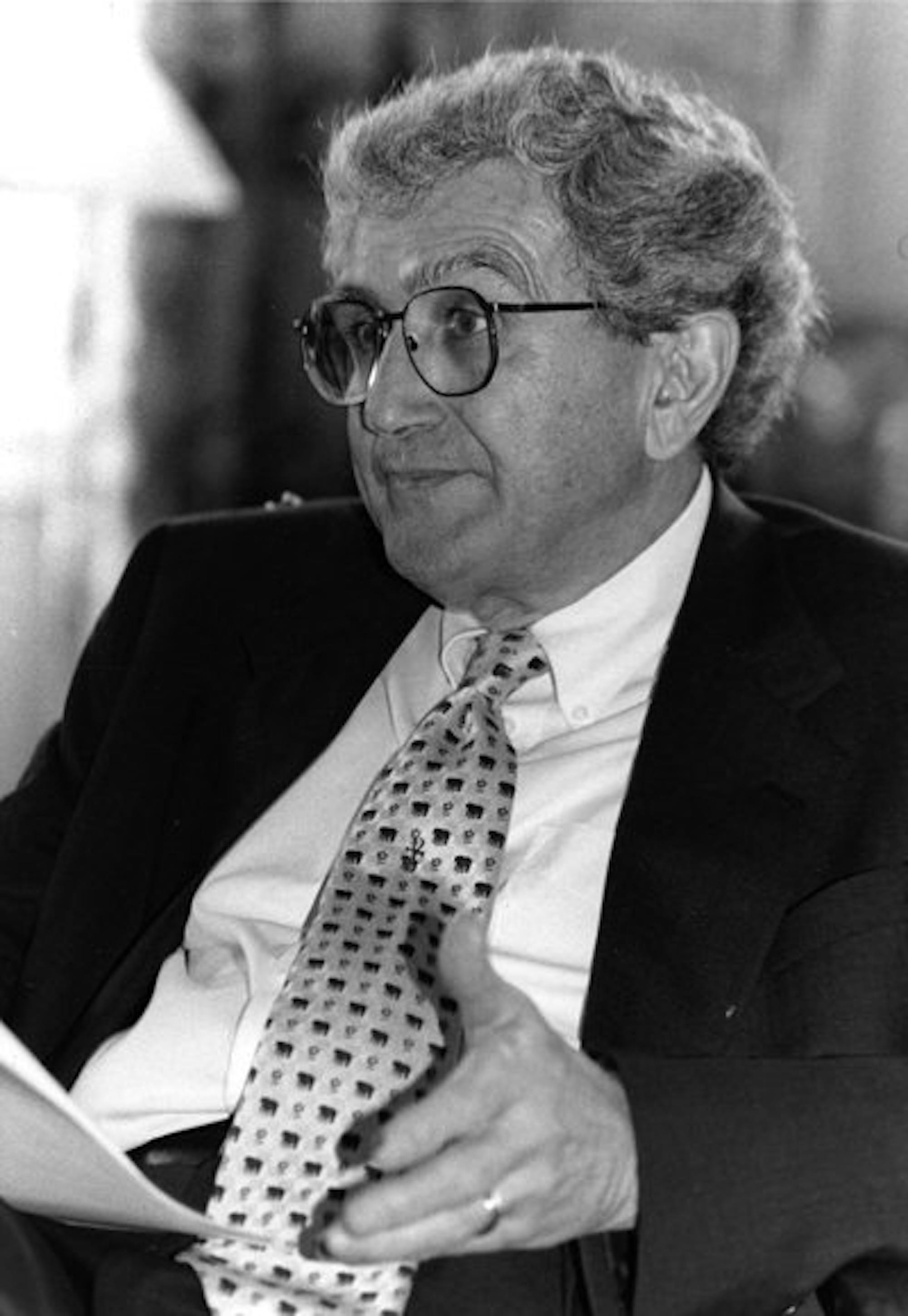Former University President John DiBiaggio died on Feb. 1 at 87. He was Tufts' 11th president, serving from 1992 to 2001.
DiBiaggio's signature achievements at Tufts include founding the University College of Citizenship and Public Service in 2000 — now known as the Jonathan M. Tisch College of Civic Life — and leading a successful capital campaign, "Tufts Tomorrow," which raised over $600 million and tripled the university's endowment.
DiBiaggio oversaw the rapid expansion of the university's physical footprint, including several new buildings in Grafton, as well as Dowling Hall and the Gantcher Family Sports and Convocation Center on the Medford/Somerville campus.
He is also remembered as being an affable and welcoming presence to everyone on campus.
Professor Leila Fawaz, the Issam M. Fares Chair of Lebanese and Eastern Mediterranean Studies, said that DiBiaggio struck her as "accessible, kind and supportive" during her tenure as dean for arts and humanities for Arts, Sciences and Engineering from 1996 to 2001.
"I recall visitors and parents of prospective students commenting on how exceptionally welcoming he was, compared to many at other colleges they visited. I recall staff mentioning how he would stop by their car in the aftermath of a snowstorm and help them dig their car out," Fawaz wrote in an email to the Daily. "I recall administrators and others appreciating how fortunate we at Tufts were and noting how lucky we have been with him and with our Tufts leaders who followed him."
University Professor Emeritus Sol Gittleman, who was provost from 1981 to 2002 and worked under three different presidents, said that DiBiaggio was the first to turn Gifford House, the official residence of the university president, into a center of activity on campus.
"His Christmas extravaganzas were wonderful. He had the biggest Christmas tree I ever saw. His house ... for the first time, became the center of the university," Gittleman said.
DiBiaggio remains the only president in Tufts history to have held the presidency at another university before arriving on the Hill. He was president of the University of Connecticut (1979–1985) and Michigan State University (1985–1992).
"The two schools were two gigantic institutions ... with big-time athletics," Gittleman said. "Yet John DiBiaggio said that the happiest nine years he ever had w[ere] at Tufts. He loved it here."
Despite the differences in athletic culture between Tufts and his previous universities, DiBiaggio continued to display a passion for college sports and was a constant presence at Tufts sporting events, Gittleman added.
DiBiaggio's two successors as president of Tufts paid tribute to his legacy in a statement.
"John DiBiaggio’s service as president of Tufts capped a remarkable career as a leader in American higher education and has had an enduring impact on the university," University President Anthony Monaco said.
"American higher education is stronger today for his many efforts, and I am proud to have known him and to have called him not only a mentor and a colleague but also a friend," Lawrence Bacow, university president emeritus and current president of Harvard University, said.
Gittleman said that the Board of Trustees' choice of DiBiaggio to succeed Jean Mayer as university president was ideal because of Dibiaggio's stable presence.
"Jean Mayer's presidency was extremely tempestuous, very exciting, very energetic, very creative, somewhat manic and ... remarkable. We needed to calm things down a little bit," he said.
Gittleman added that DiBiaggio's philosophy as university president was, "If it ain't broke, don't fix it, don't try to tinker with things."
In his 2004 book, "An Entrepreneurial University," which chronicled the history of Tufts from 1976 to 2002, Gittleman wrote that DiBiaggio retained many key members of the administration from Mayer's tenure — including Gittleman himself — and adopted a delegating style of leadership.
DiBiaggio's people-centered approach made him especially adept at collaborating with his colleagues to bring a collective vision for the university to fruition, Gittleman said in his interview.
"John DiBiaggio's virtue as a great president was that he was able to partner with people and make wonderful things happen like [founding] Tisch College ... and raising as much money as we did, zooming up in our endowment," Gittleman said.
One of those individuals whom DiBiaggio partnered closely with is Robert Hollister, the founding dean of Tisch College who served in the position from 2000–2011.
Hollister, a professor emeritus of urban and environmental policy and planning, said that DiBiaggio saw the creation of a university-wide college as a way of combining his own interests in community service with an existing culture of volunteerism and civic participation at Tufts.
"He brought with him a very strong commitment to undergraduate volunteer service," Hollister said. "One of the first causes [that had] his attention right away when he came to Tufts was the Leonard Carmichael Society. He participated in some of their activities and was ... working on that dimension of Tufts culture and Tufts programming."
The creation of the college, which DiBiaggio saw as his monumental legacy, would not have been possible without his dedication to the cause of fostering in students an ethos of public service and his collegial spirit in convincing the trustees of his plan, Hollister added.
"At the time when ... the trustees were ready to formally approve [the college], they all understood the proposal well," he said. "That was very much the bulk of President DiBiaggio's approach... It was very much a partnership and collaboration with the trustees."
Perhaps the clearest display of DiBiaggio's personal commitment to the new college was his foray into co-teaching its signature course, "Leadership for Active Citizenship," together with Hollister.
Each class, DiBiaggio and Hollister would invite a different guest speaker to share their public service experiences, both in a community forum that was open to all and also privately with the students in their course.
"The piece that was so impressive to me in that collaboration with DiBiaggio was how confident and respectful he [was] with students. He ... never missed a class, he expressed great interest in students' questions, paper[s], presentations — just an excellent listener," Hollister said.
Even after leaving office, DiBiaggio continued to teach the course and involve himself with the college for a year as university president emeritus.
In 1999, DiBiaggio created the university-wide Presidential Award for Citizenship and Public Service to honor Tufts students for outstanding community service and leadership, Hollister added. The award has been renamed the Presidential Award for Civic Life and continues to this day.
Hollister said that DiBiaggio would be "delighted" to see the continuing changes and development of Tisch College over the past two decades.
"He very much approached the development of the college as a legacy project, but he would be the first person to say, 'I want it to continue to evolve,’" Hollister said. "He had no investment in having an overly personalized creation ... that would stay the same over time and that would always be his baby. He expected it, and wanted it, to keep changing and evolving."
Besides working closely with DiBiaggio as dean, Hollister was the first-ever John DiBiaggio Professor of Citizenship and Public Service from 2002 to 2006. This professorship was established in honor of the then-president emeritus in 2002.
Hollister was "moved" to have been named the inaugural holder of the DiBiaggio Professorship.
"I recall vividly the occasion when I gave a speech to the community — an inaugural talk [for the professorship]. That was a wonderful opportunity to express my thanks," he said. "On the part of the trustees, it was a very appropriate and meaningful way to salute a president's ... leadership."
Early into his presidency, DiBiaggio oversaw another sea change at Tufts: the outsourcing of custodial services. Formerly Tufts employees with full benefits, custodial staff were informed in March 1994 of the university's plan to lay them off and subcontract janitorial services from another company.
DiBiaggio, as president emeritus, had told the Daily in 2001 that outsourcing custodial services saved the university close to $1 million each year.
This decision was met with much opposition from students and faculty, who rallied behind the janitors, Professor of Physics and Astronomy Gary Goldstein recalled.
"We started to first try to talk to the administration — not very successfully — and then we realized we needed to make more noise. So protests began, marches around campus," he said.
Goldstein added that there were frequent meetings with DiBiaggio and his deputies about this outsourcing decision and its impact on the economic and food security of the custodial staff at Tufts.
"[At one meeting] we met in DiBiaggio's office. We talked about what we thought would have been a fair agreement with the workers and what we saw happening. They were cordial, but no movement," he said.
Despite their disagreements, Goldstein emphasized that DiBiaggio was, indeed, friendly and personable.
"My own dealings with him, outside of the custodian issue, were just as a member of various committees that met with him ... He got along well with the faculty," Goldstein said. "He was a congenial person, easy to talk to, seemingly agreeable."
DiBiaggio retired as university president in May 2001. He stayed at Tufts for an additional year to advise his successor and help with fundraising, while also teaching his leadership course.
When announcing his departure in 2000, he had told the Daily that he would not consider taking on another university president position.
“Where are you going to find a place quite like this?” DiBiaggio said in 2000. “I couldn’t imagine being at another university that would be as desirable as this one.”
Yet, as someone who had spent over 20 years at the helm of various universities, DiBiaggio could not help but remain active in higher education even in his retirement.
He was appointed by former Mass. Governor Mitt Romney to the University of Massachusetts' Board of Trustees in 2003 and served as an external advisor to the University of Colorado in 2004 amid allegations of sexual misconduct by its student-athletes.
DiBiaggio's ability to build on Tufts' existing strengths made him a successful university president, Hollister said.
"To me, in terms of President DiBiaggio's legacy, one is of course Tufts' distinctive focus on education for active citizenship — a key part of his lasting accomplishments," Hollister said. "He was building on what was already a strong part of Tufts' institutional DNA, and he was, in fact, reinforcing and taking it to the next step."
Former University President DiBiaggio dies at 87

Former University President John DiBiaggio is pictured.





